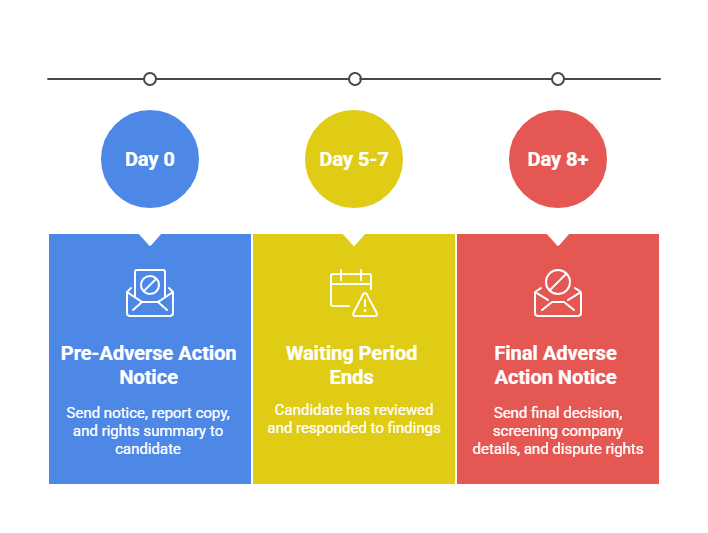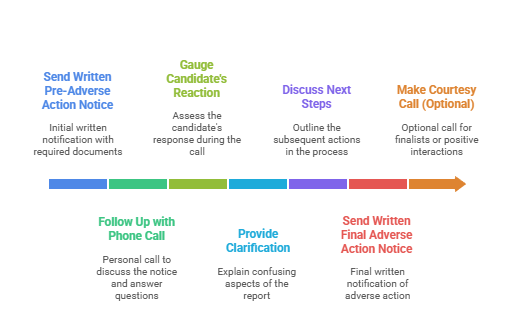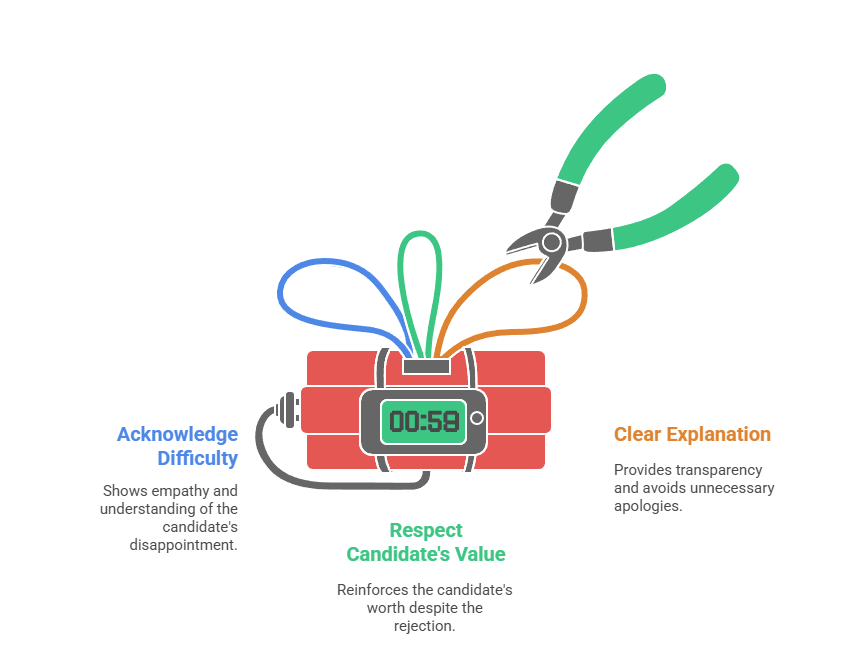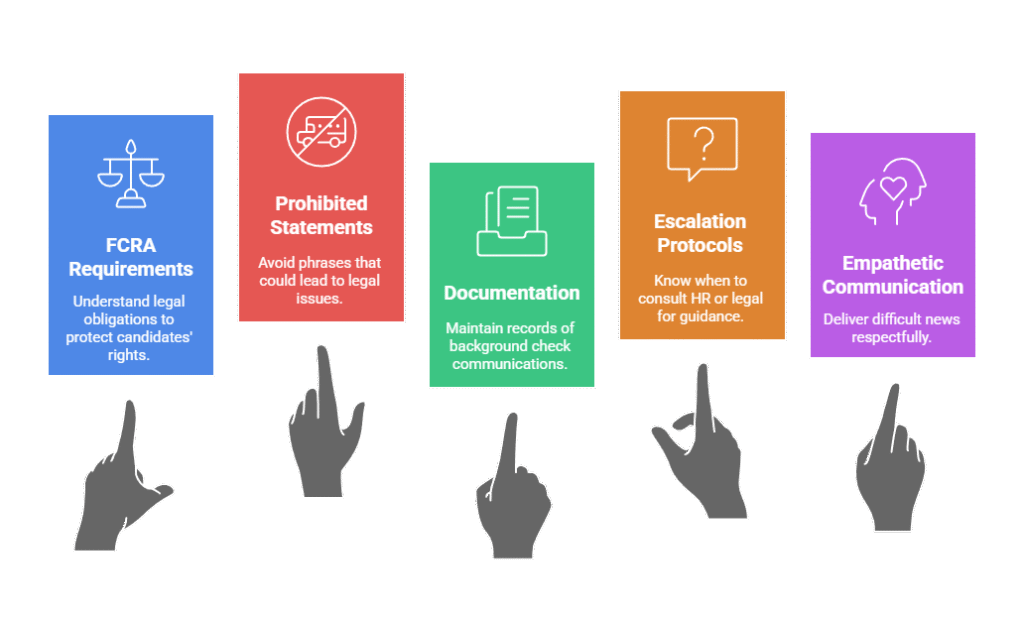Explaining background check results to candidates requires balancing legal compliance with empathetic communication to protect your organization while maintaining positive candidate relationships. This comprehensive guide provides HR professionals and hiring managers with practical frameworks, compliant messaging templates, and proven strategies to navigate sensitive conversations about background screening outcomes in 2025.
Key Takeaways
- Federal law mandates adverse action procedures when denying employment based on background check findings, including pre-adverse and final adverse action notices with specific waiting periods.
- Transparent communication builds trust and reduces legal risks, even when delivering unfavorable news about employment decisions based on screening results.
- Document every interaction throughout the background check disclosure process to establish a defensible audit trail that protects against potential litigation.
- Customize your messaging approach based on the specific findings, distinguishing between criminal records, employment verification discrepancies, and credit report issues.
- Provide candidates with dispute rights and clear instructions for correcting inaccurate information, as required by the Fair Credit Reporting Act (FCRA).
- Train hiring teams consistently on compliant communication protocols to ensure your organization maintains uniform standards across all candidate interactions.
Understanding Your Legal Obligations When Explaining Background Check Results
The Fair Credit Reporting Act establishes strict requirements for employers who use consumer reports in hiring decisions. Before explaining background check results to any candidate, you must understand these foundational compliance requirements that govern every interaction. These federal protections ensure candidates receive fair treatment throughout the employment screening process.
When adverse information appears on a background screening report, employers cannot simply reject candidates without following proper procedures. The FCRA requires a two-step adverse action process that gives applicants time to review findings and dispute inaccuracies. This protection exists because background check companies occasionally report incorrect information that could unfairly damage someone's employment prospects. Understanding these requirements protects both your organization and the candidates you evaluate.
Your organization faces potential liability ranging from statutory damages of $100 to $1,000 per violation, plus actual damages, attorney fees, and punitive damages in cases of willful noncompliance. In 2024, the Consumer Financial Protection Bureau increased enforcement actions against employers who failed to provide proper adverse action notices. Average settlements exceeded $85,000. Beyond financial penalties, non-compliance damages your employer brand and creates recruitment challenges in competitive talent markets.
The FCRA Adverse Action Process: Step-by-Step
Understanding the adverse action timeline helps you plan candidate communications effectively while maintaining legal compliance. This process protects candidates' rights while allowing employers to make informed hiring decisions based on accurate background information. Following each step carefully minimizes legal exposure and demonstrates your commitment to fair hiring practices.

Pre-Adverse Action Requirements
The pre-adverse action notice represents your first formal communication when background check findings may lead to a rejection. You must provide candidates with three specific documents simultaneously. These include a pre-adverse action letter explaining your preliminary decision, a complete copy of the consumer report containing the adverse information, and a Summary of Rights document prepared by the Consumer Financial Protection Bureau.
Most compliance experts recommend a waiting period of five to seven business days after sending pre-adverse action notices. This reasonable timeframe allows candidates to receive the documents, review the findings, gather supporting documentation, and contact you with disputes or explanations. Some states mandate specific waiting periods. California requires five business days and New York City requires three business days before proceeding to final adverse action. Never skip this waiting period, as doing so creates immediate FCRA liability regardless of how concerning the background check findings appear.
Final Adverse Action Communication
After the waiting period expires and you've considered any candidate responses, you may proceed with final adverse action if the decision stands. The final adverse action notice must include specific information required by federal law. You must clearly state the name, address, and phone number of the background screening company that provided the report.
The notice must explicitly state that the screening company did not make the employment decision and cannot explain why you made your decision. Additionally, you must inform candidates of their right to dispute the report's accuracy directly with the screening company. You must also inform them of their right to request an additional free copy of the report within 60 days. These elements protect candidates' ability to correct inaccurate information that might affect future employment opportunities.
The final adverse action letter should maintain a professional, respectful tone even though the news is unfavorable. Many organizations include a statement thanking candidates for their interest and time invested in the application process. This courteous approach preserves your employer brand and leaves a positive final impression despite the outcome.
Crafting Compliant Communication Templates
Standardized templates ensure consistency while reducing compliance risks across your hiring team. However, templates should serve as starting points that you personalize for individual situations rather than rigid scripts that feel impersonal. The right balance creates efficiency without sacrificing the human touch that candidates deserve during difficult conversations.
Your pre-adverse action template should open with a clear statement about the preliminary decision. Consider this language: "Based on information in your background check report, we are considering withdrawing our conditional job offer for the [Position Title] position." Follow this with specific instructions about the enclosed documents and the candidate's rights. Include a deadline by which they must respond if they wish to dispute the findings or provide additional context.
The final adverse action template requires different language that confirms the decision is final. Begin with: "After careful consideration of your background check report and any information you provided, we have decided not to proceed with your employment for the [Position Title] position." This definitive language prevents confusion while maintaining professionalism. Include all required FCRA disclosures about the screening company's role and the candidate's dispute rights. Provide multiple contact methodsâemail, phone, and a physical addressâso candidates can easily reach your HR team with questions or concerns.
| Document Type | Required Elements | Timing |
| Pre-Adverse Action Notice | Preliminary decision statement, complete background report copy, Summary of Rights document, dispute instructions | Before making final decision |
| Final Adverse Action Notice | Final decision statement, screening company contact information, dispute rights explanation, free report offer | After waiting period and consideration of candidate response |
Both templates should be reviewed annually by employment law counsel to ensure they reflect current federal and state requirements. Many states have enacted their own background check laws with requirements beyond federal FCRA standards. Your templates must comply with the most stringent applicable law.
Explaining Specific Types of Background Check Findings
Different types of adverse findings require tailored communication approaches that address the specific concerns while maintaining legal compliance. Your explanation strategy should vary based on whether the issue involves criminal history, employment verification discrepancies, or other screening components. Customizing your approach demonstrates professionalism while addressing the unique sensitivities each finding type presents.
Communicating About Criminal History
Criminal record findings represent the most sensitive category requiring careful, compliant communication. Before any discussion, ensure you've completed an individualized assessment considering the nature of the offense, time elapsed since conviction, and relationship to job responsibilities. Many jurisdictions now have "ban the box" laws prohibiting automatic disqualification based on criminal history. Several states require written explanations of how specific convictions relate to job duties.
When discussing criminal findings, focus on job-relatedness rather than moral judgments about past behavior. For example: "Our review identified a [type of conviction] from [year]. Given the financial responsibilities of this position, including [specific duties], we have concerns about how this conviction relates to essential job functions." This approach demonstrates you conducted the individualized assessment required by Equal Employment Opportunity Commission guidance. It also avoids discriminatory blanket exclusions that could expose your organization to legal challenges.
Provide candidates with an opportunity to explain circumstances, demonstrate rehabilitation, or correct inaccurate information. Many applicants have compelling explanations about their criminal history that might change your assessment. Someone might explain that a theft conviction resulted from a disputed business partnership rather than dishonesty toward employers. Others can provide evidence of rehabilitation, community service, or successful employment history since the conviction that mitigates concerns.
Addressing Employment Verification Discrepancies
Employment history discrepancies range from minor date inconsistencies to material misrepresentations about job titles, responsibilities, or reasons for leaving. Your communication approach should be proportionate to the severity of the discrepancy and the candidate's explanation. Not all discrepancies warrant adverse action, so assess each situation individually based on its significance to the position.
For minor inconsistenciesâsuch as claiming employment until March when records show Februaryâreach out conversationally: "We noticed a small difference between the end date you provided for [Company Name] and what our verification found. Can you help us understand this discrepancy?" Many timing differences result from innocent confusion about whether to report the last day worked versus when final paychecks were issued. These situations rarely warrant adverse action if the candidate provides a reasonable explanation. Most employers show flexibility with minor date variations that don't affect the candidate's qualifications.
Material misrepresentations require more serious conversations and often justify adverse action. When a candidate claims to have been a department manager but verification reveals they held an entry-level role, this raises concerns about honesty that transcend the specific position. In these cases, your communication should be direct: "Our verification showed your title at [Company Name] was [Actual Title] rather than [Claimed Title] as listed on your application. This represents a material discrepancy that affects your qualifications for this position." Document the discrepancy thoroughly and the candidate's response to protect against potential claims of unfair treatment.
Explaining Credit Report Issues
For positions involving financial responsibilities, credit reports may reveal relevant information about money management. However, several states and cities now prohibit or restrict employment decisions based on credit history, so verify your local laws before using this information. Where permitted, credit information must clearly relate to specific job duties to justify adverse employment decisions.
When credit findings lead to adverse action in jurisdictions where it's permitted, explain the specific connection to job duties. Consider this language: "The position of [Title] requires [specific financial responsibilities]. Our review of your credit report identified [general category of concern, such as 'significant outstanding debts' or 'recent bankruptcy'] that we believe could create unacceptable risk in this role." Avoid sharing specific dollar amounts or detailed credit information in your communications. This level of detail isn't necessary and may make candidates uncomfortable.
Credit-based adverse actions frequently generate disputes, as credit reports contain errors at higher rates than other background check components. The Federal Trade Commission found that one in five consumers had an error on at least one of their three credit reports. Be particularly receptive to disputes and willing to reconsider decisions when candidates provide evidence that credit report information is inaccurate or outdated. Many credit issues stem from identity theft, reporting errors, or resolved debts that shouldn't appear on current reports.
Best Practices for Sensitive Conversations
Beyond legal compliance, effective communication about background check results requires emotional intelligence and interpersonal skills that preserve candidate dignity while protecting your organization. The way you deliver difficult news significantly impacts how candidates perceive your company and whether they might pursue legal action. Thoughtful communication strategies transform potentially adversarial interactions into professional exchanges that reflect well on your organization.
Choosing the Right Communication Channel
Phone conversations generally provide the best forum for explaining background check results because they allow real-time dialogue while conveying empathy through tone of voice. Written communications can feel impersonal and cold when delivering disappointing news. However, you must still provide written notices to satisfy FCRA requirements, so the ideal approach combines both channels for maximum effectiveness and legal compliance.

Consider this sequence: Send the required written pre-adverse action notice with all mandatory documents, then follow up with a phone call to walk the candidate through what they received and answer questions. This combined approach satisfies legal requirements while demonstrating human consideration. During the phone conversation, you can gauge the candidate's reaction, provide clarification about confusing aspects of the report, and discuss next steps in a conversational manner that written communication cannot replicate. Taking time for this personal touch often prevents misunderstandings that could escalate into formal complaints.
For final adverse action, written notification is typically sufficient since you've already had previous interactions. However, some organizations choose to make a brief courtesy call for candidates who were finalists or with whom they had particularly positive interactions. This extra step personally delivers the news before the letter arrives and demonstrates respect for the candidate's investment in your hiring process.
Maintaining Empathy While Protecting Your Organization
Empathy doesn't require you to apologize for conducting background checks or making employment decisions based on legitimate findings. Instead, empathy means acknowledging that receiving adverse news is difficult and treating candidates respectfully throughout the process. You can be both compassionate and firm in your employment decisions.
Use phrases that validate the candidate's perspective while maintaining your organization's position. These examples demonstrate empathetic communication that protects your interests:

- Acknowledgment of difficulty: "I understand this news is disappointing, especially after the time you invested in our interview process."
- Respect for the candidate's value: "Your qualifications impressed us, which is why we extended a conditional offer before the background check."
- Clear explanation without over-apologizing: "Based on the findings in your background report and the specific requirements of this position, we've determined we cannot move forward with your employment."
Train your hiring managers to listen actively when candidates provide explanations or dispute findings. Even if you ultimately proceed with adverse action, candidates deserve to feel heard. Taking notes during these conversations demonstrates you're genuinely considering their input rather than treating the adverse action process as a formality. This respectful approach often prevents legal challenges because candidates feel they received fair treatment even when the outcome disappointed them.
State-Specific Considerations for Background Check Communications
State and local laws increasingly add requirements beyond federal FCRA standards, creating a complex compliance landscape for multi-state employers. These variations affect how you explain background check results and what additional steps you must take. Understanding your specific obligations based on where candidates work prevents costly compliance failures and discrimination claims.
Ban the Box Laws and Criminal History Restrictions
Several jurisdictions prohibit or restrict criminal history inquiries until late in the hiring process. "Ban the box" laws affect timing rather than whether you can ultimately consider criminal records, but they require careful communication sequencing. In these jurisdictions, you cannot mention background checks or criminal history in job postings or initial applications.
California's Fair Chance Act requires employers to complete an individualized assessment before taking adverse action based on criminal history. Employers must then provide candidates with written notification including the disqualifying conviction and an explanation of how it relates to job duties. Candidates must receive at least five business days to respond with evidence of rehabilitation or mitigating circumstances.
| Jurisdiction | Key Additional Requirements | Impact on Communication |
| California | Fair Chance Act individualized assessment; 5-day response period | Must explain job-relatedness of criminal findings; longer adverse action timeline |
| New York City | Ban the box; written explanation of criminal history relevance required | Cannot inquire about criminal history until conditional offer; detailed written justification needed |
| Philadelphia | Ban the box; criminal history review after first interview | Adjusted timing for background check discussions; cannot be initial screening criterion |
Other State-Specific Requirements
Geographic variations extend beyond criminal history requirements. Nevada prohibits adverse employment actions based on cannabis use except for safety-sensitive positions, requiring careful communication when drug screening reveals marijuana use. Illinois requires specific consent language for background checks that differs from federal requirements. Massachusetts limits how far back criminal history searches can extend based on the type of offense.
Multi-state employers should implement a "highest common denominator" approach, following the most stringent requirements that apply to any of their locations.
Building a Candidate-Centric Communication Framework
Exceptional organizations view background check communications as part of the broader candidate experience rather than merely a compliance exercise. This perspective transforms potentially negative interactions into opportunities to demonstrate your culture and values. Even candidates who don't ultimately join your organization can become advocates who speak positively about how you treated them throughout the process.
Creating Pre-Screening Transparency
The best time to explain background check procedures is before you order the background check, not when adverse findings appear. During the hiring process, clearly communicate what screening components you'll conduct, why these checks are necessary for the specific role, and how candidates can prepare. This proactive approach sets appropriate expectations and reduces anxiety about the screening process.
Consider adding this language to your conditional offer communications: "Your employment is conditional upon satisfactory completion of a background check that includes [specific components]. We conduct these screenings to ensure safe workplaces and protect our clients, employees, and assets. You'll receive a separate authorization form that explains your rights under federal law." Continue with: "If any findings raise concerns, we'll provide you with all required notices and an opportunity to review and dispute the information before making a final decision." This proactive transparency demonstrates your commitment to fair processes and helps candidates understand what to expect.
Candidates appreciate knowing what components you'll screen and rarely object to legitimate screening when employers explain the business rationale clearly. Some organizations provide tips to help candidates prepare, such as suggesting they review their own credit reports or criminal records before the official background check. This transparency builds trust and often surfaces issues early that candidates can address proactively rather than discovering them during the adverse action process.
Training Your Hiring Team on Compliant Communication
Inconsistent messaging across your hiring team creates legal exposure and candidate confusion. Every person involved in hiring should understand the adverse action process, know which statements are appropriate, and recognize when to escalate to HR or legal counsel. Regular training ensures your entire team maintains the same high standards for background check communications.
Develop a training program covering these essential topics for all hiring managers:

- FCRA requirements overview: What the law requires and why these protections exist for candidates.
- Prohibited statements: Phrases that create legal exposure, such as promising "we don't hold old convictions against people" or discussing findings before providing proper notices.
- Documentation requirements: What information must be recorded about background check communications and decisions.
- Escalation protocols: Which situations require HR or legal consultation before proceeding.
- Empathetic communication techniques: How to deliver difficult news respectfully while protecting the organization.
Quarterly refresher training keeps these principles top-of-mind and provides opportunities to discuss actual scenarios your team encountered. Many organizations use anonymized case studies from their own experience to illustrate common challenges and appropriate responses. This practical approach helps hiring managers understand how abstract legal principles apply to real-world situations they'll face.
Documenting Background Check Communications
Thorough documentation protects your organization if candidates later claim they didn't receive proper notices or were denied opportunities for discriminatory reasons. Your documentation should tell a complete story of what information you considered, how you analyzed findings, and what communications occurred. This paper trail becomes invaluable if you face legal challenges months or years after hiring decisions.
Essential Documentation Elements
For every background check that reveals potentially adverse information, your file should contain specific elements that demonstrate compliance. First, preserve the complete background check report exactly as you received it, since screening companies sometimes update or correct information over time. Include your individualized assessment documentation showing written analysis of how specific findings relate to job requirements. This analysis is legally required in many jurisdictions, particularly for criminal history.
Store copies of all notices you sent to candidates, including pre-adverse action, final adverse action, and any other written communications about findings. Maintain records of phone conversations noting the date, time, participants, and summary of discussion topics and candidate responses. Keep any materials candidates provided, such as dispute letters, rehabilitation evidence, or explanatory documentation. Finally, document your decision rationale with a clear explanation of why findings led to adverse action, connecting specific report information to job-related concerns.
Record Retention Requirements
| Document Type | Retention Requirement |
| Background check reports | At least 2 years after employment decision (federal); some states require longer |
| Adverse action notices | Same as background check reports |
| Candidate dispute materials | Same as background check reports |
| Decision rationale documentation | Same as background check reports |
| Individualized assessment for criminal history | Retain indefinitely in jurisdictions with Fair Chance laws |
Organizing Documentation Systems
Well-organized documentation allows you to demonstrate compliance years after hiring decisions when legal challenges sometimes arise. Store these records according to your document retention policy, typically at least two years after the employment decision for FCRA purposes. However, other laws may require longer retention periods, so consult with employment counsel about your specific obligations.
Create a standardized filing system that makes it easy to locate specific candidate records and supporting documentation. Consider using electronic document management systems that allow keyword searching and automated retention schedules. Ensure that access to these sensitive records is limited to authorized personnel and that your storage methods comply with data privacy requirements in your jurisdiction.
Handling Disputes and Follow-Up Questions
Even with clear communication, candidates sometimes dispute background check findings or request additional information about your decision-making process. How you handle these follow-up interactions matters for both legal compliance and candidate experience. Responsive, professional handling of disputes demonstrates your commitment to accuracy and fairness.
Responding to Accuracy Disputes
When candidates claim background check information is inaccurate, take these disputes seriously regardless of whether you find them credible. The FCRA places the burden of ensuring accuracy on background screening companies, not candidates. You should pause your adverse action process while disputes are investigated and be willing to reconsider decisions if information is corrected.
Your response to disputes should acknowledge receipt, explain the investigation process, and provide realistic timelines. Consider this approach: "Thank you for notifying us about the potential inaccuracy in your background report. We've contacted [Screening Company Name] to investigate this matter, and they have 30 days under federal law to complete their investigation." Continue with: "We will not take final action on your application until this investigation concludes. If the information is corrected, we will reconsider our preliminary decision based on the accurate report."
Background screening companies must conduct reasonable reinvestigation when consumers dispute information. This typically involves contacting the original information source such as courts, previous employers, or educational institutions. If the investigation confirms the information is inaccurate, the screening company must provide you with a corrected report. At that point, you must reconsider your employment decision based on accurate information rather than automatically proceeding with your original preliminary decision.
Addressing Requests for Reconsideration
Some candidates don't dispute factual accuracy but instead provide context or rehabilitation evidence and ask you to reconsider your decision. While the FCRA doesn't require employers to reconsider decisions based on new information beyond disputed accuracy, doing so demonstrates fairness. This approach may help you discover qualified candidates you would otherwise lose due to incomplete initial information.
Establish a clear reconsideration policy that treats candidates consistently across all situations. For example, you might commit to reconsidering decisions when candidates provide documentation of expunged or sealed records that some background checks incorrectly report. Consider evidence of identity theft showing someone else committed offenses attributed to the candidate. Review rehabilitation documentation including completion of treatment programs, educational achievements, community service, or recommendation letters from supervisors in subsequent employment. Finally, examine mitigating circumstances that provide context changing how you assess the significance of findings.
When you decide to reconsider, be genuinely open to changing your decision rather than treating it as a perfunctory exercise. If the new information doesn't change your conclusion, explain why: "We appreciate you sharing information about the circumstances surrounding [the finding] and the steps you've taken since then. However, given the specific requirements of this position, particularly [relevant job duty], we remain unable to proceed with your employment at this time." This explanation demonstrates you seriously considered the additional information even though it didn't change the outcome.
Maintaining Your Employer Brand Through Difficult Conversations

How you handle background check communications significantly impacts your employer brand and reputation in the talent market. Candidates who feel treated fairly and respectfully during adverse action processes are less likely to leave negative reviews, warn others away from your company, or pursue legal action. Your communication approach during these challenging moments reveals your organizational character more than almost any other aspect of the hiring process.
Even when delivering unfavorable news, you can demonstrate your organizational values through respectful communication. Respond promptly to candidate inquiries rather than avoiding difficult conversations that feel uncomfortable. Provide clear explanations instead of hiding behind vague statements about "not being the right fit" that leave candidates confused about what actually happened. Thank candidates for their time and interest, acknowledging that they invested effort in your hiring process.
Some organizations maintain relationships with candidates who received adverse action when the disqualifying finding becomes less relevant over time. For example, a candidate denied employment due to a recent DUI might be worth reconsidering two years later when they've completed treatment, maintained clean driving records, and demonstrated rehabilitation. While you're not obligated to maintain these relationships, doing so may help you identify qualified candidates while demonstrating that your background check policies focus on job-related risk rather than permanent disqualification. This long-term perspective reflects well on your organization and shows candidates you evaluate circumstances holistically rather than applying rigid lifetime bans.
Conclusion
Explaining background check results to candidates requires careful attention to legal compliance, empathetic communication, and organizational risk management. By following the FCRA adverse action process meticulously, documenting your decisions thoroughly, and treating candidates with respect throughout screening interactions, you protect your organization while maintaining a positive employer brand reputation. The most effective approach combines standardized templates ensuring consistency with personalized communication acknowledging individual circumstances. As background check regulations continue evolving in 2025 and beyond, staying current with federal and state requirements while prioritizing transparent, candidate-centric communication will position your organization as an employer of choice that values both safety and fairness.
Frequently Asked Questions
What must be included in a pre-adverse action notice?
A compliant pre-adverse action notice must include three components: a letter explaining you're considering denying employment based on background check findings, a complete copy of the consumer report containing the adverse information, and a Summary of Your Rights Under the Fair Credit Reporting Act document. You must provide all three documents before making a final employment decision, allowing the candidate reasonable time (typically 5-7 business days) to review the information and respond with disputes or explanations. Failing to include any required component creates FCRA liability regardless of whether the background check findings were accurate or job-related.
Can I discuss background check findings with a candidate before sending formal notices?
You should not discuss specific adverse findings with candidates before providing the required pre-adverse action notice and documents. Informal conversations about concerning information create confusion about the formal adverse action timeline and may lead candidates to believe they've been denied employment before receiving proper notices. If a candidate asks about their background check status before you've sent notices, you can explain that screening is in progress and that you'll provide all required information if any findings might affect your decision. Once you've properly delivered the pre-adverse action notice, you can and should have follow-up conversations to answer questions and discuss any context the candidate provides.
How long should I wait between pre-adverse action and final adverse action?
Federal FCRA law doesn't specify an exact waiting period, but most employment law attorneys recommend 5-7 business days as reasonable time for candidates to receive documents, review findings, and respond. Several states and cities mandate specific waiting periods: California requires at least five business days, while New York City requires three business days. Your waiting period should account for mail delivery time if you send notices by postal mail, though electronic delivery with confirmation of receipt allows shorter timelines. If a candidate responds before the waiting period expires with a dispute or request for additional time to gather documentation, you should extend the timeline to allow proper investigation of their concerns.
What happens if a candidate disputes information in their background check?
When a candidate disputes background check accuracy, you must pause your adverse action process and contact the screening company that prepared the report to request reinvestigation. The background check company must complete a reasonable investigation within 30 days (though most finish much faster) by contacting original information sources to verify accuracy. If the investigation reveals the information was inaccurate, the screening company provides you with a corrected report, and you must reconsider your employment decision based on accurate information. If the investigation confirms the information is accurate, you may proceed with adverse action. Document the dispute, investigation results, and your reconsideration process thoroughly to demonstrate you took the candidate's concerns seriously.
Do I need to explain exactly why someone failed a background check?
You must provide candidates with a copy of their complete background check report, which shows them what information appeared, but you're not legally required to explain which specific findings led to your decision or provide detailed reasoning. However, some jurisdictions require additional explanations for criminal history decisionsâCalifornia and New York City, for example, require written statements explaining how specific criminal convictions relate to job duties. Even where not legally required, providing general explanation of concerns often benefits your organization by demonstrating you conducted an individualized assessment, reducing misunderstandings that might lead to legal challenges, and maintaining better candidate relationships. You can explain concerns without excessive detail: "The financial responsibilities of this role, particularly handling cash deposits and accessing customer accounts, create concerns in light of the theft conviction on your background report."
Can I reconsider a background check decision if the candidate provides additional information?
Yes, you can reconsider employment decisions at any point, and doing so often makes good business sense when candidates provide compelling context or rehabilitation evidence. While the FCRA doesn't require reconsideration based on mitigating circumstances (only for disputed accuracy), many organizations establish policies to review decisions when candidates submit evidence of rehabilitation, expunged records, letters of recommendation from subsequent employers, or explanations of circumstances. If you reconsider and change your decision, send the candidate written confirmation that employment will proceed based on your review of additional information. If reconsideration doesn't change your decision, explain that you appreciated their additional information but your employment decision remains unchanged based on the position's specific requirements. Document the reconsideration process and your reasoning to demonstrate thorough, fair evaluation.
Additional Resources
- Fair Credit Reporting Act Compliance Guide for Employers
https://www.ftc.gov/business-guidance/resources/using-consumer-reports-what-employers-need-know - EEOC Guidance on Arrest and Conviction Records
https://www.eeoc.gov/laws/guidance/arrest-and-conviction-records - Consumer Financial Protection Bureau Summary of Rights
https://www.consumerfinance.gov/consumer-tools/credit-reports-and-scores/ - Professional Background Screening Association Best Practices
https://www.psbassociation.org/ - State Ban the Box Laws Comprehensive Overview
https://www.nelp.org/publication/ban-the-box-fair-chance-hiring-state-and-local-guide/ - Sample Adverse Action Notice Templates
https://www.shrm.org/resourcesandtools/tools-and-samples/hr-forms/pages/adverse-action-notices.aspx

GCheck Editorial Team
Meet the GCheck Editorial Team, your trusted source for insightful and up-to-date information in the world of employment background checks. Committed to delivering the latest trends, best practices, and industry insights, our team is dedicated to keeping you informed.
With a passion for ensuring accuracy, compliance, and efficiency in background screening, we are your go-to experts in the field. Stay tuned for our comprehensive articles, guides, and analysis, designed to empower businesses and individuals with the knowledge they need to make informed decisions.
At GCheck, we're here to guide you through the complexities of background checks, every step of the way.





